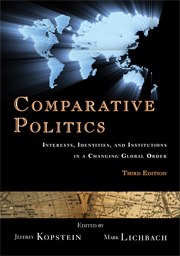Book contents
- Frontmatter
- Contents
- List of Maps
- Preface to the Third Edition
- List of Contributors
- 1 What Is Comparative Politics?
- 2 The Framework of Analysis
- PART ONE EARLY DEVELOPERS
- PART TWO MIDDLE DEVELOPERS
- 5 Germany
- 6 Japan
- STOP AND COMPARE
- PART THREE LATE DEVELOPERS
- PART FOUR EXPERIMENTAL DEVELOPERS
- Index
- References
6 - Japan
from PART TWO - MIDDLE DEVELOPERS
- Frontmatter
- Contents
- List of Maps
- Preface to the Third Edition
- List of Contributors
- 1 What Is Comparative Politics?
- 2 The Framework of Analysis
- PART ONE EARLY DEVELOPERS
- PART TWO MIDDLE DEVELOPERS
- 5 Germany
- 6 Japan
- STOP AND COMPARE
- PART THREE LATE DEVELOPERS
- PART FOUR EXPERIMENTAL DEVELOPERS
- Index
- References
Summary
Introduction
Japan is a fascinating country for political scientists to study. Within the space of a century, Japan went from being an almost completely isolated feudal society to the world's second richest country and a stable democracy.
Japan's interests, identities, and institutions have both been shaped by and played a significant role in shaping the global order. Under the threat of Western imperialism, Japan fought for its economic and political autonomy. As a result, Japan was the only imperial power in Asia, itself becoming a colonizer rather than a colonized state. Like Germany, Japan experimented with democracy in the 1920s before succumbing to militarist powers in the 1930s. Japan launched the Pacific War with the bombing of Pearl Harbor on December 7, 1941, and had conquered much of East and Southeast Asia before Japan's eventual defeat with the U.S. atomic bombings of Hiroshima and Nagasaki, respectively on August 6 and 9, 1945. Japan was occupied by the U.S.-led allied forces from its defeat in war until it regained sovereignty in April 1952. The subsequent democratic transition of postwar Japan can be considered among one of the most successful cases of democratization that occurred during what Samuel Huntington has referred to as the Second Wave of countries to democratize.
The Japanese Constitution, which was drafted with great U.S. influence, includes an article (Article 9) that renounces war as a sovereign right of the nation.
- Type
- Chapter
- Information
- Comparative PoliticsInterests, Identities, and Institutions in a Changing Global Order, pp. 180 - 210Publisher: Cambridge University PressPrint publication year: 2008



